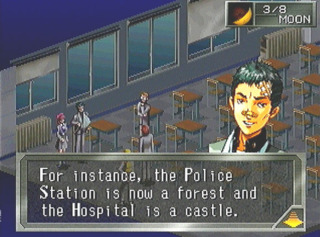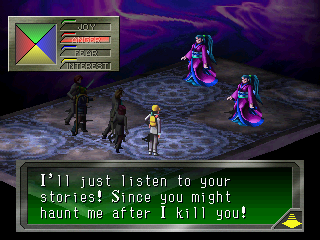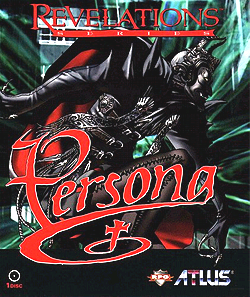A unique experiment that fails to achieve any of its goals.
Despite the title, Revelations: Persona is not part of the Revelations series, but of the long-running Shin Megami Tensei series of JRPGs. In fact, Persona was actually the first major Shin Megami Tensei game to be released outside Japan, meaning that it was the first experience many gamers had with the series. Knowing this, it would make sense for Atlus to use this as an opportunity to polish any flaws in the original Shin Megami Tensei games and start the franchise with a clean slate. However, this statement is only partially true; Persona manages to fix some of the problems of its predecessors, yet not only ignores some other key defects, but introduces new ones through its new gameplay mechanics.
Regardless of these additions, Revelations is still a Shin Megami Tensei game. Like the other Shin Megami Tensei games, the plot of this game involves high school students summoning demons to fight other demons and prominent authority figures. However, unlike its predecessors, Persona chooses the themes of reality and identity instead of morality, even if those themes are mostly developed late in the game. A lot of the major plot development happens in the last hours of the game, the hours preceding it merely building up to this point without doing much of their own. While this might imply that the story pays off in the end, the game, unfortunately, never makes it that far. It definitely has a lot of thematic potential, but simply touches on its themes instead of fully developing them. Granted, there is a great amount of character development near the end of the game (especially for the player character), but even then, the development is limited to a few characters. Most likely to make up for this, the game gives you more control over who joins the party.

Unlike many other combat systems, the battles in Persona allow you to negotiate with demons mid-battle, although this aspect is, at best, a supplement to the regular combat. Each character has their own set of techniques, like dancing or bribing, and each technique affects a given demon differently. How the demons are affected is somewhat of a mystery, as the same action on the same demon can often elicit completely different responses. The game says that the phase of the moon influences how demons behave, to a certain degree, but this influence is hard to see, if it is there at all. In fact, a lot of the negotiation seems steeped in mystery. Depending on the results of the battle, you can end the battle prematurely, finding out that negotiation does not (automatically) give you any experience. It feels cheap, especially since speaking to the demons can sometimes require more effort than actually fighting them, and the rewards do not justify this imbalance. This may not seem like too small an issue to warrant mentioning, but Persona is definitely an RPG with a lot of grind (especially near the end), partly due to the game being designed around it. Rather than receiving a universal lump sum of experience at the end of each battle, each character builds it up over the course of the battle, depending on how much they participate. Although realistic, it is not a forgiving system, since low-level characters cannot participate as much, meaning they will get less experience and require more battles to get the experience that everyone else is receiving.
In addition to determining a character's relative strength, levels also determine which Personae you can get. While obviously the main combat system for the game (it is in the title, after all), actually making and using Personae is not available for a considerable amount of time and is more complex than it should be. First, you need two spell cards from different demons (you can only carry one card per demon at a time), which requires winning the demons over in negotiation. Next, you need to bring the cards to a Velvet Room, usually at the mall. When you finally decide to make a Persona, you soon discover that your options are, at the same time, wide and extremely limited. Even a few cards present a multitude of possibilities, which is then greatly multiplied when you realize that attaching items changes the end result, but a lot of those are off-limits because your level will be too low. This does not include the Personae you can create, but, for whatever reason, nobody can use, mainly because the game never tells you who can use a Persona until it's too late.

As a matter of fact, there are many aspects of Revelations that comes off as unintuitive, the simple act of navigating the world being the first thing that comes to mind. This does not include navigating the world map, which, while oddly restrictive, is still very easy to explore. You can pull up a map at any time to show where you and important locations are, and the world is small and filled with enough variety to make it hard to get lost. The same cannot be said for the dungeons, which have done nothing to improve the navigation problems in previous games. Dungeons are still in first person, but with minimal improvements. For example, larger, open areas are now presented in grid formation, but the isometric presentation makes exploration just as much a problem as it is in the rest of the dungeons. Also, you have access to two maps in dungeons: an on-screen radar that shows what is slightly ahead of you, and a larger map that syncs up with your personal exploration instead of the radar. Understandably, it is very easy to get lost in these massive dungeons, since everything looks the same and the game seems to know how hard it is to navigate its own dungeons. Several dungeons, for example, feature completely black areas where radar is useless, meaning navigation is done solely through the map and trial and error. Given that the game barely clocks in at 20 hours long, it is easy to see that this feature was added to pad the length of the game, not as an interesting new feature with any legitimate difficulty or value, a point made more obvious by the lack of an automatic warp out of dungeons once you have completed your goal in them.
Revelations: Persona, being the first major Western release of a Shin Megami Tensei game ( Jack Bros. not included), should be a refined game that fixes all the problems its forerunners showed without doing away with everything that makes the series unique. The result, however, is an incredibly unintuitive game where even the simple act of navigation is a laborious task. Revelations does show some potential for a fun game in its Persona system, but since even this major feature is a lot of effort for little reward, it is hard to label this game as enjoyable. Overall, the good ideas Revelations presents never outshine the poor execution tied to them.
